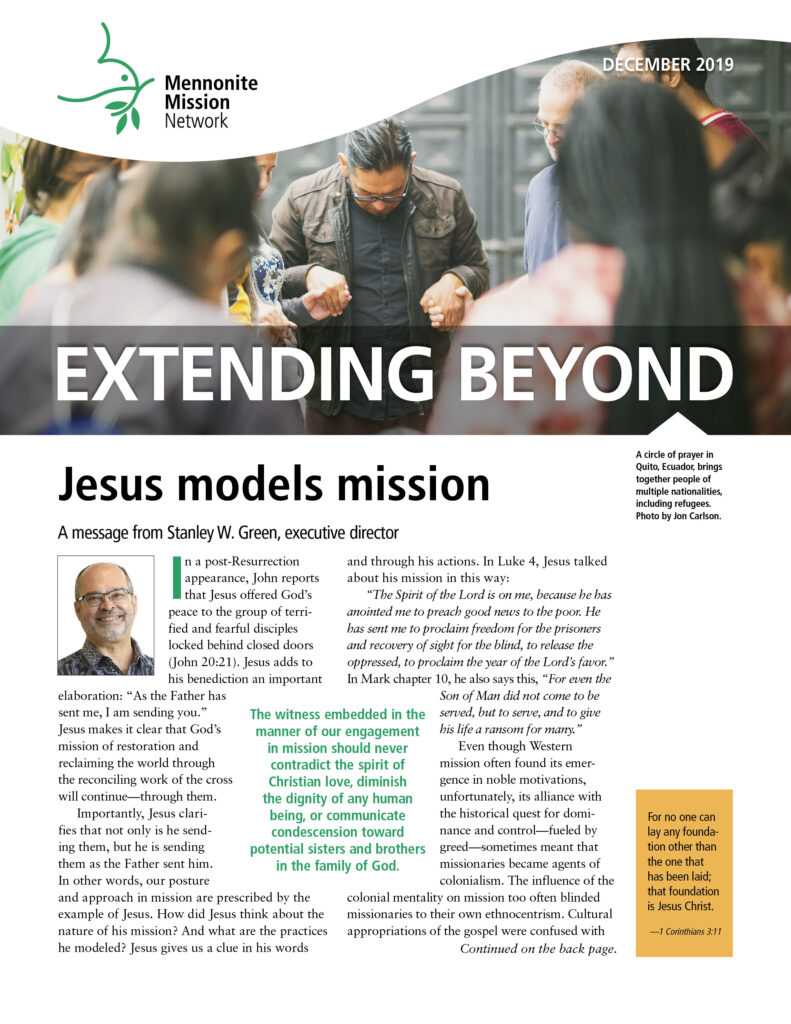In a post-Resurrection appearance, John reports that Jesus offered God’s peace to the group of terrified and fearful disciples locked behind closed doors (John 20:21). Jesus adds to his benediction an important elaboration: "As the Father has sent me, I am sending you." Jesus makes it clear that God’s mission of restoration and reclaiming the world through the reconciling work of the cross will continue—through them.
Importantly, Jesus clarifies that not only is he sending them, but he is sending them as the Father sent him. In other words, our posture and approach in mission are prescribed by the example of Jesus. How did Jesus think about the nature of his mission? And what are the practices he modeled? Jesus gives us a clue in his words and through his actions. In Luke 4, Jesus talked about his mission in this way:
"The Spirit of the Lord is on me, because he has anointed me to preach good news to the poor. He has sent me to proclaim freedom for the prisoners and recovery of sight for the blind, to release the oppressed, to proclaim the year of the Lord’s favor." In Mark chapter 10, he also says this, "For even the Son of Man did not come to be served, but to serve, and to give his life a ransom for many."
Even though Western mission often found its emergence in noble motivations, unfortunately, its alliance with the historical quest for dominance and control—fueled by greed—sometimes meant that missionaries became agents of colonialism. The influence of the colonial mentality on mission too often blinded missionaries to their own ethnocentrism. Cultural appropriations of the gospel were confused with the gospel itself. Sadly, moreover, the cultural medium within which the gospel was transmitted was deemed to be superior. Mission thus devolved into telling unevangelized cultures how their inferior cultures would be enriched by an embrace of Western cultural forms and practices.
Determined to pattern ourselves after the example of Jesus, we at Mennonite Mission Network are striving to learn how to listen, show empathy and respect, and to cultivate mutuality in our mission engagements. Taking Jesus’ injunction seriously demands that the witness of our approach, presence and lifestyle mirror the message we seek to proclaim in our words. The witness embedded in the manner of our engagement in mission should never contradict the spirit of Christian love, diminish the dignity of any human being, or communicate condescension toward potential sisters and brothers in the family of God.
David Bosch’s influential text, Transforming Mission, has profoundly shaped thinking about mission in the 21st century, insisting that it be rooted in the transformation of all people engaged in the mission encounter. It is imperative that those who see themselves as called to share the gospel should also anticipate—indeed, even invite—transformation with regard to their understandings of racism and injustice, ethnocentrism and cultural superiority, coercion and violence, along with the many other ills that encumber cross-cultural exchange.
Reflecting the Anabaptist influences on his thinking, Stanley Hauerwas has argued that the Church does not have but is a social ethic. Anabaptists have long insisted that the character of the kingdom community is its primary mission. At Mennonite Mission Network we believe we need constantly to be asking critical questions: How does our mission practice reflect the way of Jesus? How can we listen more than speak, and refrain from providing answers before we understand the questions? How can we be more self-critical of our own ethnocentric points of view and assumptions about our cultural superiority? Paradoxically, we believe that such humility will allow us to be more bold, and more honest, in our proclamation of the good news that is ours in Jesus Christ. Thanks for joining us on this journey of transformation and seeking to do mission in the way of Jesus.
Stanley W. Green
Executive Director

